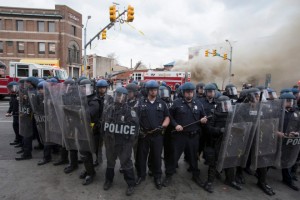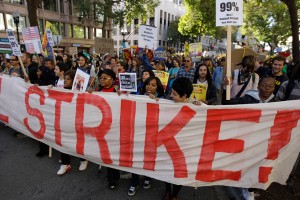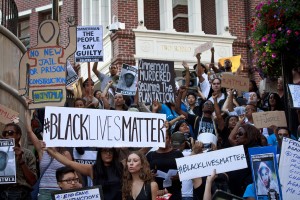También en español
The past decade has seen a wide range of important struggles and campaigns for social justice in the U.S., from the Occupy Wall Street movement to the fight for LGBTQ equality. We are seeing the 99% starting to find its political voice. More recently, though, the cutting edge of struggles has been the fight against inequality spurred by fast-food workers and the growing movement against police brutality. Since the revolt in Ferguson after the killing of Michael Brown a year ago, Black Lives Matter (BLM) has spread nationally and won limited, but important, victories. For the first time in many years, police officers are facing indictment for murdering civilians. BLM has broken open a public debate and has had a big effect on raising consciousness. Critically, the movement has led to the emergence of new young Black activists and leaders.
But this also raises the question of how to build a sustained movement that can continue to win gains and also start to tackle the broader structural issues of mass incarceration and discrimination in employment, housing, and other institutions in society. Many of these same issues of movement-building have important relevance for the struggle of women and the LGBTQ community against oppression.
Socialists argue that serious reforms are won as a result of powerful social movements. The more powerful the movement, the more that can be won. But also, the stronger the movement, the greater is the resistance by the ruling class. This poses the importance of developing dynamic and successful strategies and tactics to take the movement forward. For example, Socialist Alternative has emphasized the need to link up the anger of oppressed communities on questions like police violence with economic and social issues such as low pay, unemployment, gutted social services, blighted inner cities, affordable housing, etc.
The Fight for Reforms
Clearly, the ruling elite is on the defensive on police brutality, as vivid examples of blatant police killing and brutality have flooded the Internet. The establishment is split on this issue. It is worth remembering that mass incarceration on the scale we see today is a relatively recent phenomenon. It is the result of the racist “War on Drugs” initiated by Republicans in the 1970s under Richard Nixon and largely supported by the Democrats.
Many in the elite now see elements of this policy as outdated. Many also see an economic benefit from reducing the numbers in jail. This gives the movement a unique opportunity to push hard and force the ruling class to dismantle key parts of drug and mass incarceration policy.

Racism has been part of the foundations of American society from the beginning. Slavery was abolished through a revolutionary Civil War, but economic and social discrimination against Black people, backed by brutal repression, remained entrenched. Racist ideology was used to justify the status quo and to prevent the unity of oppressed people on class lines. Despite talk of a “post-racial” society, the ruling class will not abandon institutional racism and sexism, just as it will not abandon economic exploitation, since it is necessary for its survival. In fact, facing growing anger and incipient revolt by sections of the working class and poor, it will revert to more direct repression and racist “divide-and-rule” policies in an attempt to weaken the movement. There has already been increased use of militarized police against social protests in recent years.
So, does this mean that we cannot win major reforms that directly affect the lives of black people? Socialists say that we absolutely can win improvements. But our ability to win major reforms will depend on the strength, scale, and resolve of our movement. It will also depend on potential splits in the ruling class and their determination to resist the struggle.
Historically, the capitalists have been willing, under pressure, to give concessions – sometimes even far-reaching ones, if fundamentally challenged – to at least maintain their control of society in the long run. However, to maintain their ability to make a profit, they will move to claw back any concessions they give. A socialist challenge to their rule, linked to a mass movement of working people, not only offers a fundamental alternative, but also, by building such a movement, we can win the biggest concessions today.
Sections of the ruling elite are now willing to reduce the level of mass incarceration, reform drug policies, and even grant a $15 minimum wage in some cities – with many limitations – since they hope that these concessions can dampen anger at inequality and can even provide an increased market for some capitalists. Also, in the case of the minimum wage, it is a better alternative for them than dealing with a serious movement to unionize the workplace. But such concessions can also act as a spur to the movement to fight for more.
Lessons From Past Struggles
The struggle to overthrow institutional racism is linked to fighting for and winning reforms. The Civil Rights movement grew stronger out of the successful Montgomery Bus Boycott, the fight to desegregate lunch counters, and the march on Selma. It forced open divisions in the ruling class and exposed the brutality of U.S. racism to a national and international audience. But, more importantly, it raised the hopes, expectations, and combativeness of Black workers and youth.
The movement soon had to adjust its strategy and tactics to address the resistance of the ruling elite. Particularly instructive is the evolution of Martin Luther King, Jr. Today, establishment figures quote his earlier speeches, especially the “I Have A Dream” speech, to serve their purpose. But in his last years King began to grapple with how to fight the wider aspects of structural racism.
![Leaders of March on Washington for Jobs & Freedom marching with signs (R-L): Rabbi Joachim Prinz, [unidentified], Eugene Carson Blake, Martin Luther King, Floyd McKissick, Matthew Ahmann & John Lewis. (Photo: Robert W. Kelley / The LIFE Picture Collection / Getty Images)](http://socialistalternative.org/wp-content/uploads/2015/09/0116mlk02-300x192.jpg)
Socialists support the basic conclusion drawn by King and other radicals, including the Black Panthers, that to seriously challenge institutional racism, as well as racist attitudes, will involve building a movement that embraces all those oppressed by capitalism – and that the Democratic Party cannot be a reliable ally.
Fighting for Reforms and Building a Mass Movement
Socialists see class exploitation as an essential unifying aspect of the experience of the vast majority of all oppressed sections of society. Capitalism exploits workers by paying them less than the amount of value they create through their labor. Black people, Latinos, women, immigrants, and LGBTQ people are disproportionately concentrated in low-wage jobs. Their exploitation as workers is a common factor that can unite their struggles against all forms of oppression under capitalism. Also, as part of the broader working class, they have enormous potential power through their ability to withdraw their labor and stop the flow of profits to the bosses.

In the fight to end oppression, the role of a united working class is essential, since it can shut down the economy through major industry-wide strikes and general strikes. By mounting powerful struggles, it can bring together the vast majority of the population into a movement, not only to demand major reforms, but also to end capitalism. But in order to do this, the working class needs to be mobilized into fighting organizations around a program that speaks to the needs of those facing special oppression, as well as to their needs as workers.
This task of uniting working people is linked to the need to raise the understanding of white workers about racism and the affects of divide-and-rule tactics by those in power. This is a task that the labor movement must take up.
The lack of an independent political party that represents and fights for workers and the poor seriously weakens the fight against low wages, oppression, and racist ideas within the working class. This has allowed big business and the 0.1% to dominate politics. Also, the labor movement is in a vastly weaker position compared to the past and is saddled with a leadership that has systematically avoided social struggle and mistakenly seen the Democrats as their friends.
Yet working-class struggles are emerging around low wages and the demand for a $15 an hour minimum wage. By uniting the struggles against low wages with the movement against police brutality and racism, we can bring more people into the struggle and raise consciousness on both issues. The Fight For $15 national day of action on April 15 was the largest and most dynamic yet, exactly because it brought together activists from both movements.
Socialism: An Alternative to Capitalism
It should be increasingly clear that capitalism and the ruling class cannot tolerate major reforms. In fact, compared to the 1960s, when the U.S. economy was growing rapidly, there is a much narrower scope for serious reform within the framework of the profit system. And even when we won major reforms in the past, the ruling elite aggressively sought to take them back at the earliest opportunity. The narrow desire for profit that drives capitalism can only benefit a minority of society. The task is to redistribute power in society away from the billionaire class and the 200 massive banks and corporations that dominate our society and to put power into the hands of the vast majority. This is called socialism.
When the vast majority of society – the working class – runs society through democratic control and management of workplaces and communities, when they have a say on all the important decisions that affect them, and when the control of the media and other institutions is taken out of the hands of the owners of mega-corporations – the elite 0.01% – then the policies of society will be made in the interests of the vast majority.
When power is taken out of the hands of the tiny minority, then there will be no need to discriminate based on race and gender. This way, we can create a society without oppression based on race, gender, and sexuality, ensuring that everyone receives a living-wage job, quality housing and health care, and the other essential needs of life while, at the same time, tackling climate change by redirecting the economy away from carbon-based production.
In the most militant phases of the Black freedom movement, as with the labor movement, the vision of a socialist alternative to capitalism has been a huge motivating force for tens of thousands of activists who played a key role in taking the struggle forward. It raised their sights to see that the hard struggle to win reforms is also an integral part of a broader struggle: to create a new society that can end poverty and discrimination.
Taking the Movement Forward Today
Socialist Alternative sees building support for a broad, fighting program as a key ingredient in organizing powerful and successful struggles. This program must speak to the real needs of the movement and not be limited to what is acceptable to the Democratic Party or what is thought possible under capitalism.
To address mass incarceration and institutionalized racism, Socialist Alternative calls for:
- An end to the racist War on Drugs. Decriminalization and legalization of marijuana use. Treat drug addiction through rehabilitation, not criminalization. Release from jail and strike clean the criminal record, including reinstatement of voting rights, for all those arrested for minor nonviolent drug offenses
- Community control of all aspects of policing. Local policing to be overseen by elected community oversight boards with full powers over the police, including department policies and procedures. Independent, anti-racist candidates from community organizations and unions should run for these boards
But we also put forward demands that can bring wider sections of the poor and workers into the movement. For example, we call for guaranteed quality jobs with a $15 an hour minimum wage, as well as a massive investment in public education, transit, health care, and other economic services paid for by taxes on the super-rich and corporations.

And, in order to take the new Black freedom movement forward, we call for coordinated national protests against racism, police violence, and economic inequality.
The ability to unite around clear, attainable demands, which can bring together the struggles of the 99% on all aspects of oppression, is key to winning real gains. Our ability to fight for and win reforms is essential, not only for the gains won, but because it gives ordinary people a sense of their collective power and raises their sights to fight for more. These struggles will also help to create a coherent political organization and leadership, which will lead the decisive struggles to come against the entire system of capitalism and the structural racism which is built into its foundations.


